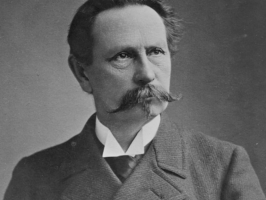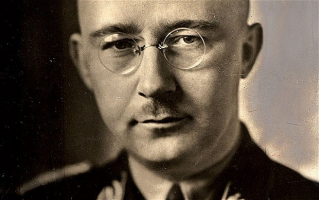Top 9 Interesting Facts About Karl Marx
Karl Heinrich Marx FRSA, a German philosopher, economist, historian, sociologist, political theorist, journalist, and socialist revolutionary, lived from 5 May ... read more...1818 to 14 March 1883. Marx's political and philosophical ideas had a significant impact on later historical periods in the fields of thinking, economy, and politics. His name has been applied to a social theory school, an adjective, and a noun. Let's learn more about this great person through some interesting facts about Karl Marx!
-
Karl Marx was born on May 5, 1818 in Trier, then a town in the Kingdom of Prussia and today a city in Germany, at Brucken Gasse 664. He was the third of Heinrich Marx and Henrietta Pressburg's nine children. When his brother Moritz passed away in 1819, he was left as the oldest child. Heinrich Marx was a prominent jurist of the age of enlightenment who was drawn to the works of Voltaire and Immanuel Kant. He participated in the movement in Prussia for reforms and a constitution. Marx's parents were both Jewish and came from a long line of rabbis. But before Karl was born, Heinrich changed his religion from Judaism to Lutheranism, perhaps to get away from the restrictions of anti-Semitic laws. When Karl was six years old, he underwent baptism.
Henrietta Pressburg, his mother, was from a wealthy business family that went on to build Philips Electronics, one of the biggest electronics firms in the world today. The Philips Company was founded in 1891 as a family business by Frederick Philips, the banker-son of his uncle. In 1912, Gerard and his younger brother Anton converted the company into Royal Philips Electronics NV, which expanded to become the massive multinational it is today. Lion eventually lost patience with Marx and stopped letting him borrow money from him.
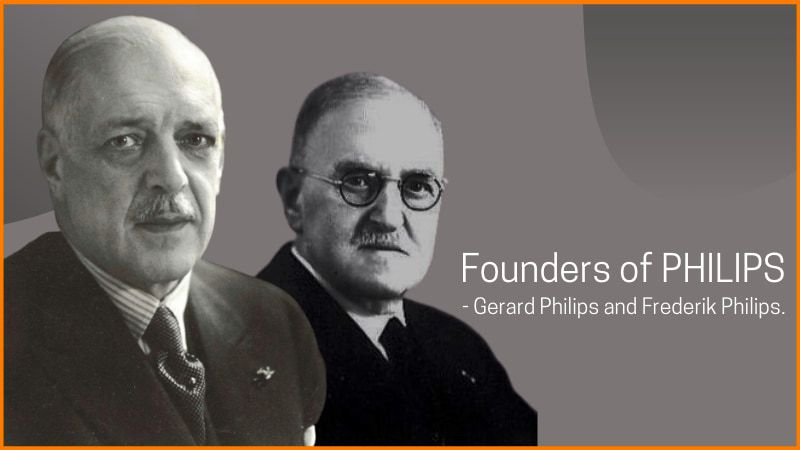
Photo: Startup Talky 
Photo: Produce Grower -
The second interesting fact about Karl Marx is that he fought a duel when he was a student. His father Heinrich Marx initially provided Karl with a private education. He attended the Trier High School from 1830 until 1835. He enrolled in the University of Bonn in October 1835 when he was just 17 years old. He only took humanities-related classes, covering topics like Greek and Roman mythology and the history of art. Marx joined the Poets' Club, an organization of political radicals, while he was a student in Bonn. He also served as co-president of the drinking club Trier Tavern Club. He led the Tavern Club, a group that disagreed with the more aristocratic student organizations, and he became a member of a group for poets that also included some political militants. It's true that Bonn had a politically dissident student culture. Particularly as a result of a student attempt to interrupt a Federal Diet session in Frankfurt, several students had been jailed and some were still being expelled during Marx's time.
Marx was once incarcerated for intoxication. A Borussian Korps member at the university also challenged Marx to a duel, which Marx accepted. Marx was fired upon, and he was fortunate to escape with only a minor injury to his left eye but he had to spend a day in jail for being intoxicated and unruly. Heinrich Marx enrolled Karl at the University of Berlin in October 1836 after becoming dissatisfied with his deeds. Marx, who attended the University of Berlin to study law, had a passion for philosophy and was especially drawn to the writings of German philosopher G. W. F. Hegel.
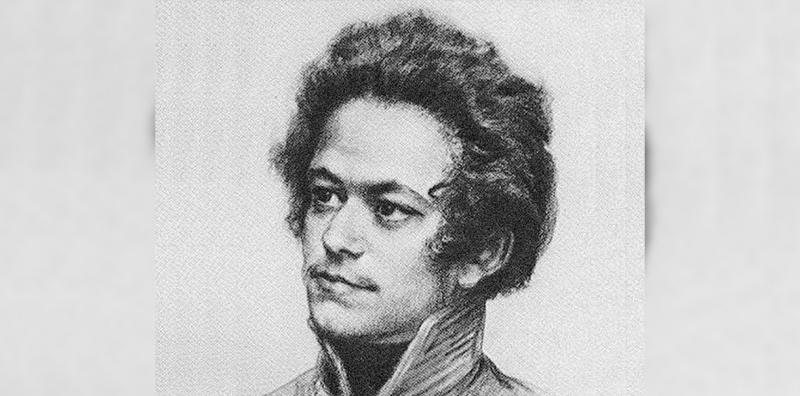
Photo: USSH 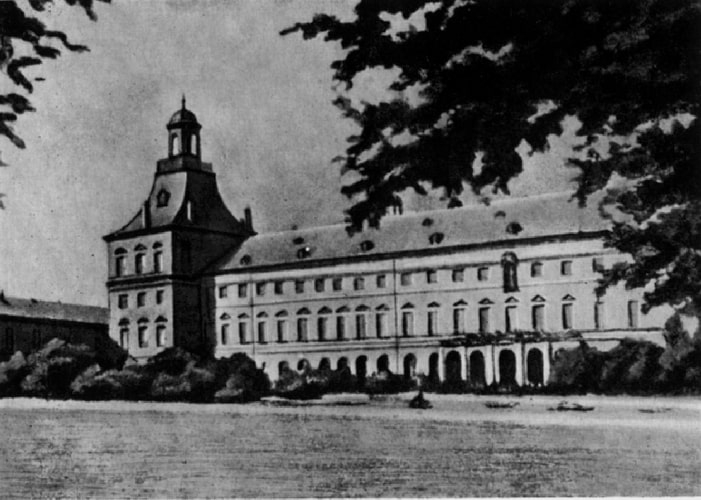
Bonn University (Photo: Sutori) -
Karl Marx found it challenging to advance in his academic career as a result of the Prussian government's rising hostility to the Young Hegelians. Marx relocated to Cologne, Germany, in 1842. Here, he started writing for the liberal democratic Rheinische Zeitung (Rhineland News), where he quickly rose to the position of editor. The paper was outlawed the next year by the Prussian government for being too radical and for printing an article that was extremely critical of the Russian monarchy.
Marx relocated to Paris in 1843, when he co-edited the Deutsch-Französische Jahrbücher, a brand-new, radical communist publication (German-French Annals). The publication was short-lived, though, and following its demise Marx started contributing to Vorwärts! (Forward! ), the last remaining uncensored German-language radical publication. The French government shut down Vorwärts in 1845 as a result of Prussian government pressure. Marx was exiled from France together with the other authors of the document, and in February 1845, he moved to Brussels, Belgium. That's the following interesting fact about Karl Marx Toplist want to share!
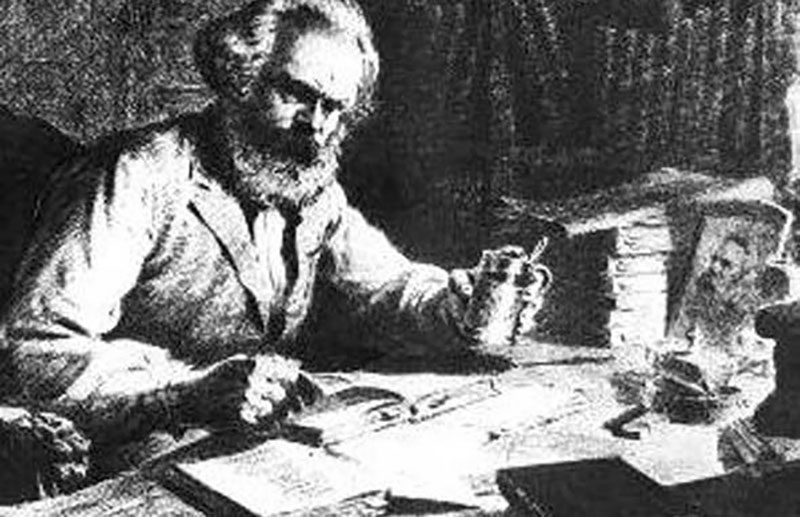
Photo: A Nova Democracia 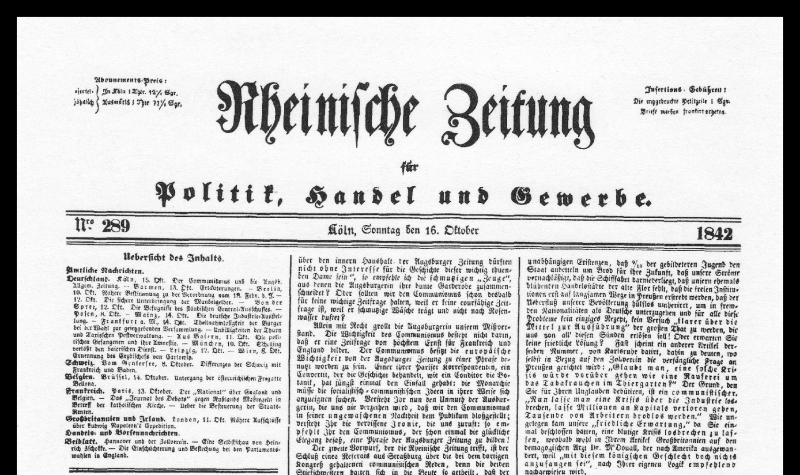
Photo: Berghahn Books -
On the way to Manchester in 1842, Friedrich Engels stopped by the office of the Rheinische Zeitung, where he first encountered Karl Marx. On August 28, 1844, they reconnected at Café de la Régence in Paris and soon grew close. They stayed friends their entire lives. Engels was the rich son of a cotton textile producer in Germany. He led two separate lives, one as a communist by night and a cotton tycoon by day. Marx received funding from Engels to disseminate their revolutionary theories. Marx actually endured poverty for the majority of his adult life, and Engels supported him financially for almost 40 years. He routinely sent Marx up to £50 every year, which is around $7,500 today. This accounted for nearly a third of his parents' annual allowance. Engels collaborated on the landmark Communist Manifesto and gave Marx assistance for his well-known book Das Kapital.
Engels made the sacrifice of Marx during his lifetime in order to support his family both materially and spiritually. Marx would scarcely have the resources to finish his extensive writings without Engels' unwavering assistance. Marx also received a lot of scientific assistance from Engels. Before the first volume of Capital was published, Engels received a sincere request from Marx to be included as a co-author, but Engels politely declined. Even in the works that the two of them jointly wrote, Engels always humbly acknowledges that Mr. Marx's companion is solely responsible for the works' primary concepts.
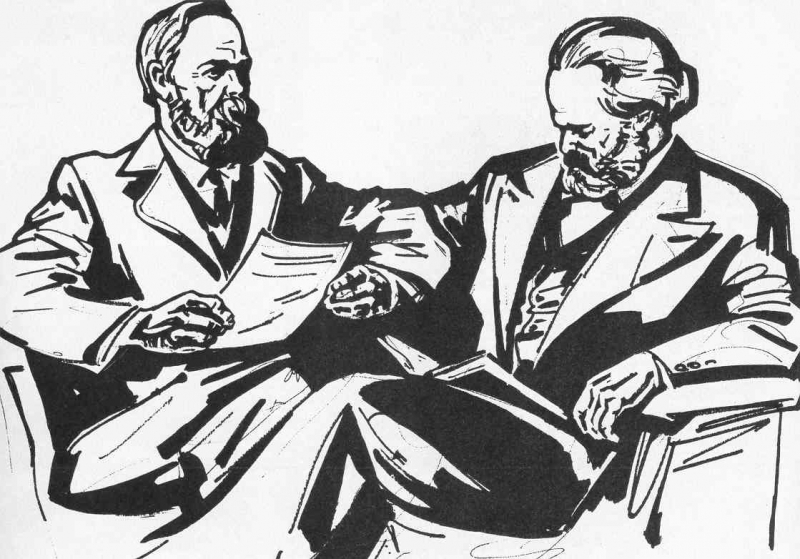
Photo: Marxists Internet Archive 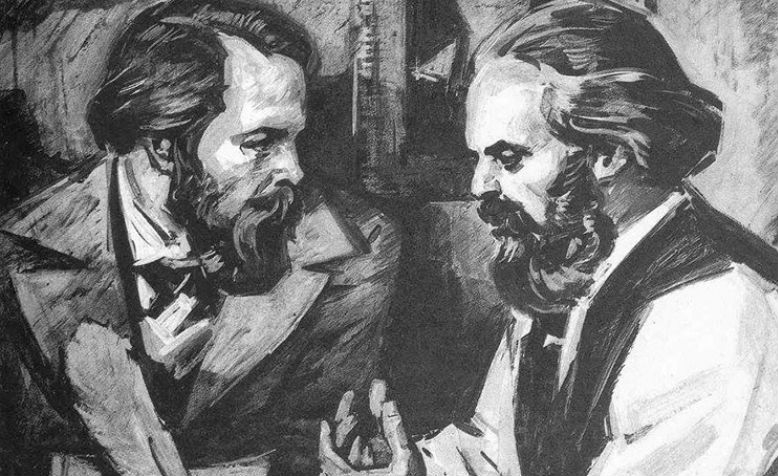
Photo: Counterfire -
The Communist Corresponding Committee was a modest political organization founded in Brussels in 1846 by Karl Marx and Friedrich Engels. German immigrants to Paris created the socialist organization known as the League of the Just in 1836. The Communist League was founded in June 1847 as a result of a merger of the League of the Just and the Communist Corresponding Committee. The Communist League Manifesto, co-written by Marx and Engels, was originally printed on February 21, 1848. This is also the next interesting fact about Karl Marx.
The political pamphlet, possibly the most influential in history, declared that class society will disappear for good when the proletariat, or working class, won their inevitable victory. It asserted that "the history of every hitherto existing society is the history of class battles." During the 1848 European Revolution, the Communist Manifesto had some impact, but only in Germany. With the rise of communism in the late nineteenth century, it would subsequently gain in importance and is today regarded as one of the most significant political writings. It continues to be widely read, and many people view it as a priceless window into contemporary society and an explanation for the world of recurring wars and repeated economic crises we live in today. Its principles continued to echo throughout the 20th century, and by 1950, over half of the world's population was governed by Marxist systems.
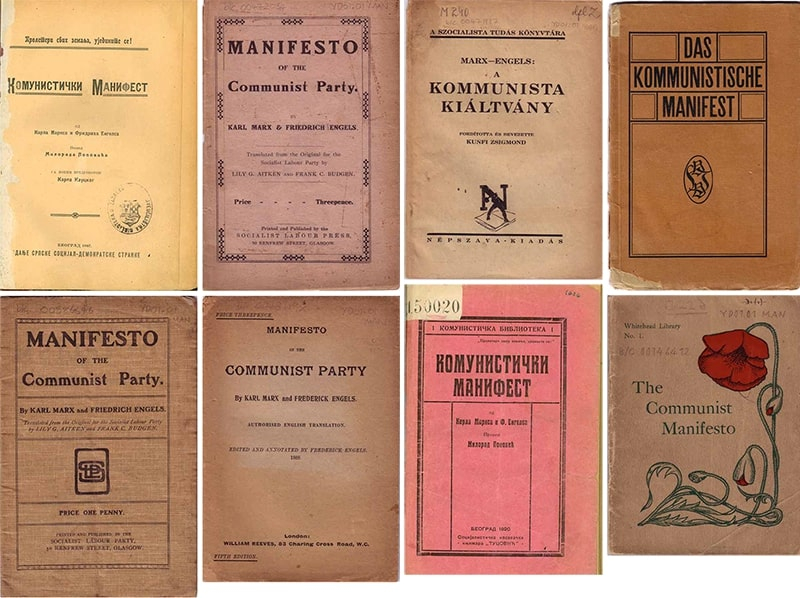
Photo: Design Observer 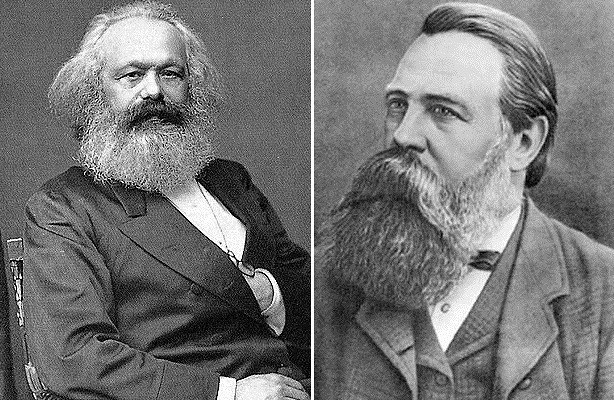
Photo: meme-arsenal -
The Belgian Ministry of Justice charged Marx with assisting Belgian workers who were organizing a revolt during the 1848 European Revolution. He was compelled to leave Belgium as a result. Before relocating to Cologne, he made a brief residence in Paris. Here, he began publishing the daily newspaper Neue Rheinische Zeitung (New Rhenish Newspaper). Marx was routinely subjected to police harassment while serving as the paper's editor. He was also tried on multiple occasions but was never found guilty. After the democratic Prussian parliament fell apart and Marx was told to leave the country in May 1849, his paper was shut. Before relocating to London, where he would spend the rest of his life, he briefly lived in Paris. Marx and Engels each started writing for six different newspapers around the world while they were in London.
He joined The New York Tribune as its European reporter in 1851 at Charles A. Dana's suggestion. The newspaper, whose editor was Horace Greeley, supported Charles Fourieri's socialist utopian ideology known as Fourierism. Marx authored about 500 articles and opinions between 1851 and 1862. His writings covered a wide range of subjects, including foreign affairs, class concerns, and government. Some of the book's most moving passages focus on the social inequalities and widespread poverty in Britain, while others explore Marx's revolutionary ideas on the slave and opium trades, which he claimed Western powers relied on and would do anything to maintain. Marx's writing is surprisingly still relevant today because, above all, his novel take on nineteenth-century events inspired his readers to ponder.
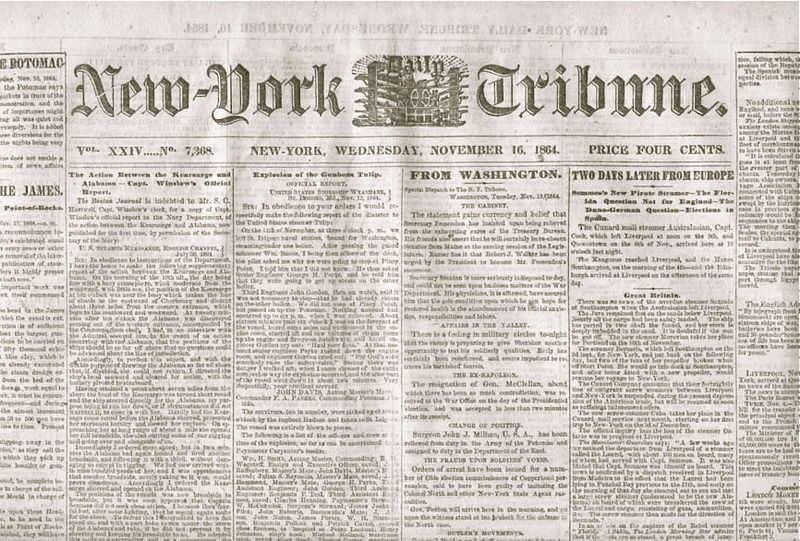
Photo: Wikipedia 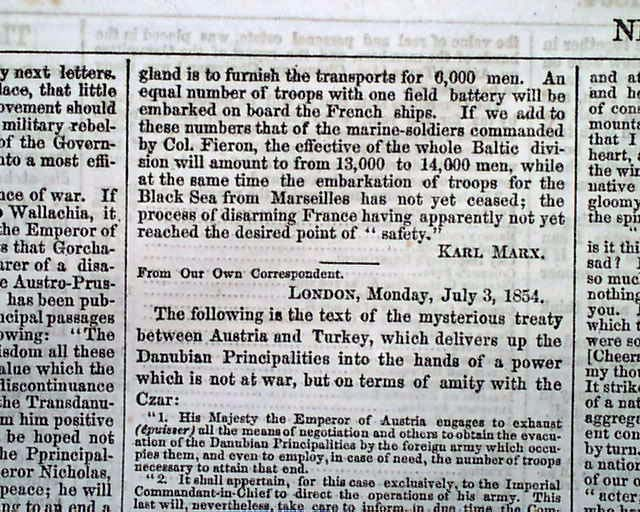
Photo: rarenewspapers.com -
Another interesting fact about Karl Marx is that he highlighted the flaws of Capitalism in his famous Das Kapital. Throughout his career, Karl Marx produced a great number of publications, many of which were unpublished or largely ignored during his lifetime but had a lasting impact on later intellectual, economic, and political history. Many people think Marx's theories on the exploitative connection between capitalist bosses and their employees are still relevant today. Marx is most known for offering a revolutionary critique of nineteenth-century capitalism. Marx released the first book of his monumental work Das Kapital in 1867. (Capital: Critique of Political Economy).
After his passing, Friedrich Engels released the second (1885) and third (1895) volumes. Das Kapital foresees the demise of capitalism due to its flaws and its replacement with a system in which the working class gains control over the economy and politics. One of the most important books in history, it serves as the theoretical cornerstone of communist philosophy, economics, and politics.
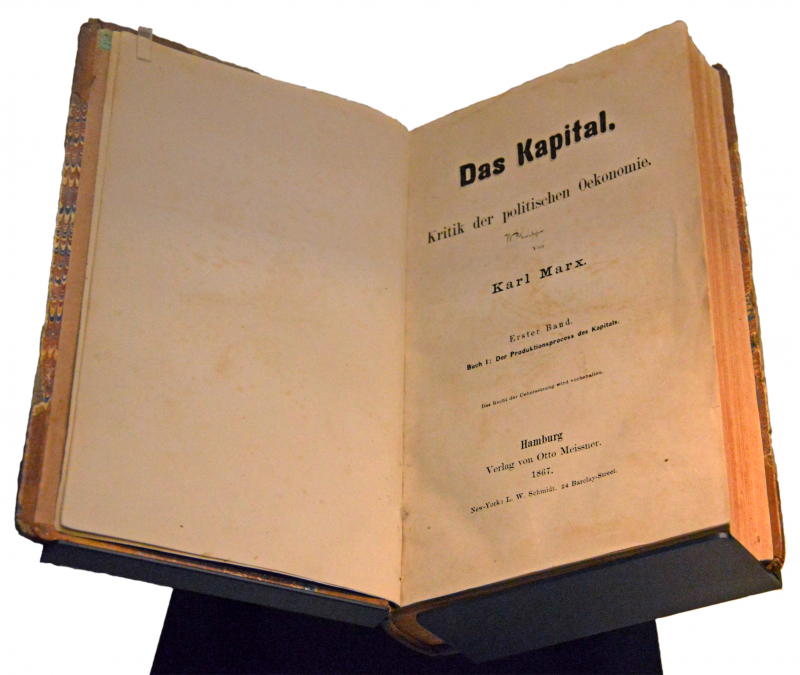
Photo: Wikipedia 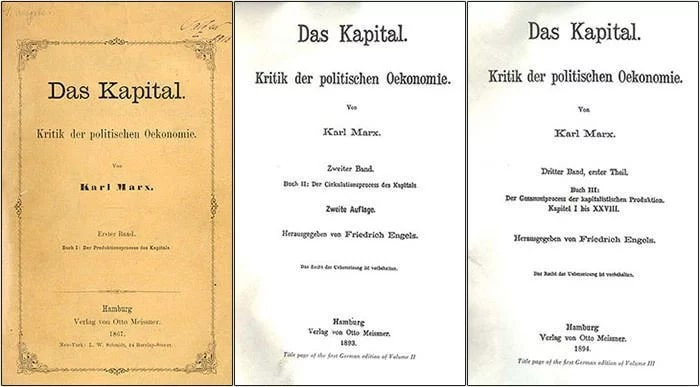
Photo: Learnodo Newtonic -
Jenny von Westphalen, who was four years his senior and came from a renowned Prussian aristocratic family, became Karl Marx's fiancée in 1836. Jenny and Karl frequently crossed paths as kids, and as teenagers, they grew close. Due to the disparity in their backgrounds—religious and social—their union was contentious, but Karl was close with Jenny's father, Ludwig von Westphalen. On June 19, 1843, in a Protestant church in Kreuznach, then-Germany, Karl Marx web Jenny von Westphalen. Three of the seven children born to the couple Jenny Caroline (1844 - 1883), Jenny Laura (1845 - 1911), and Jenny Julia Eleanor (1855 - 1898) lived to adulthood. Marx loved to give his kids colorful nicknames like "Qui Qui'' and "Tussy," and he named all of his daughters after his wife.
Additionally, Helene Demuth, Marx's long standing housekeeper and friend, is alleged to have given birth to an illegitimate son they both named Freddy. He planned a successful cover-up with Helen Demuth and Friedrich Engels, two of Marx's friends and collaborators, out of fear that this transgression would ruin his marriage and harm his reputation. Engels claimed to be the father, and Miss Demuth corroborated the lie. Fredrick Demuth, a newborn, was abandoned and entrusted to a working-class family in London to raise. This assertion, however, cannot be proven with absolute certainty.
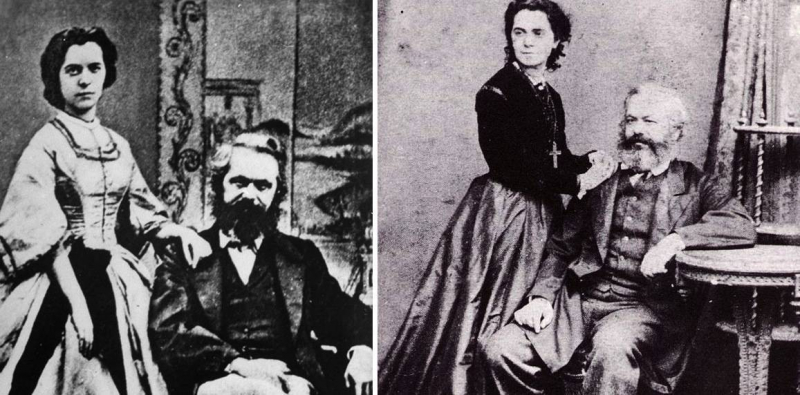
Karl Marx and his wife Jenny Von Westphalen (Photo: Flashback) 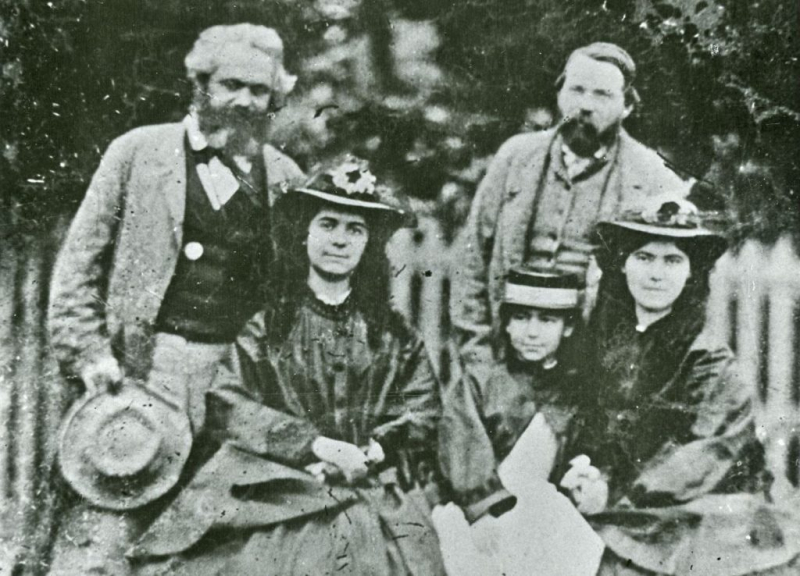
Photo: RS21 -
Karl Marx began to have health issues in 1849, and they plagued him for the remainder of his life. Headaches, ocular irritation, neuralgia in the head, and rheumatic pains were frequent side effects of the episodes. In 1877, he experienced a severe nerve illness that left him with insomnia, which he subdued with drugs. His liver and gallbladder issues, as well as the persistent skin condition hidradenitis suppurativa, have all been suggested as potential causes of his illness.
A British specialist claims that Karl Marx also had a skin condition that can have serious psychological consequences including self-hatred and estrangement. According to Sam Shuster in the British Journal of Dermatology, the hidradenitis suppurativa affected the father of communism's life and attitudes. One of its signs is alienation, which Marx, a sufferer of boils and carbuncles, articulated in his book Das Kapital. Apocrine sweat glands, which are located in the groin and armpits, are affected by the disease hidradenitis suppurativa. Blackheads, lumps that resemble boils, patches, and pus-leaking lesions can all be seen on the skin in the affected areas.
Marx's sickness was made worse by his penchant for alcoholic beverages, frequent smoking, and midnight work schedules. Marx experienced a catarrh after the passing of his wife in December 1881, which kept him unwell and finally contributed to the bronchitis and pleurisy that ultimately led to his death. On March 14, 1883, in London, Karl Marx passed away. At 64 years old, he was. His daughters Eleanor and Laura were left behind. Engels donated a sizable chunk of his $4.8 million inheritance to Marx's daughters after his passing in 1895. This one also ends the Toplist's list of interesting facts about Karl Marx!
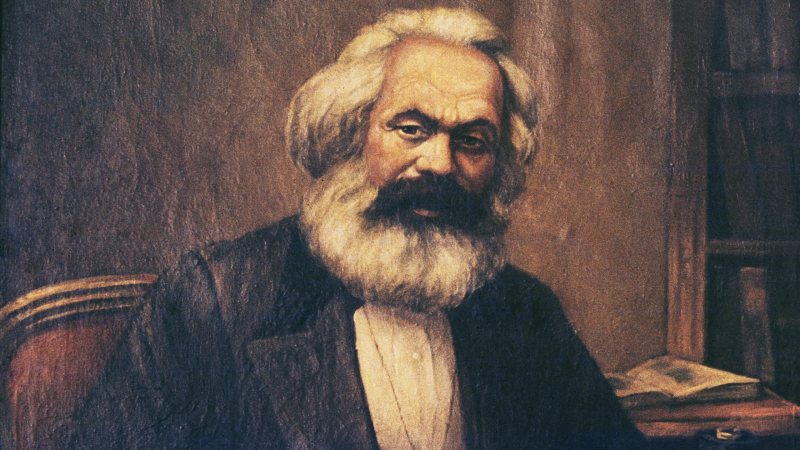
Photo: Teen Vogue 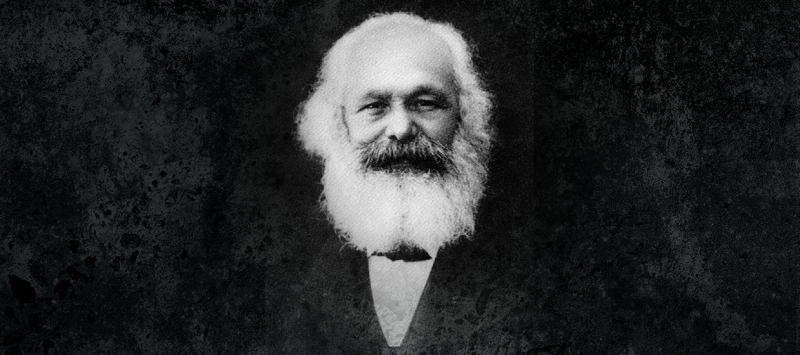
Photo: The Week











